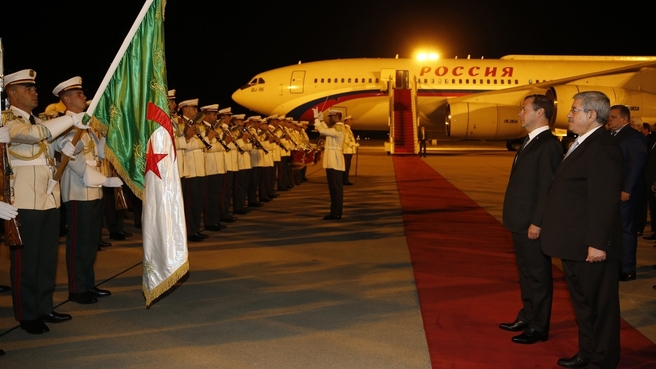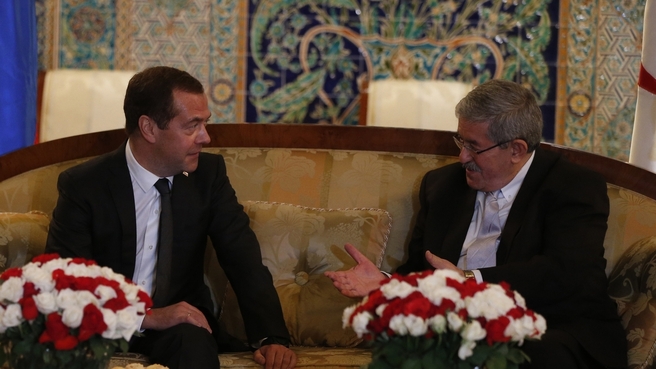Ahead of his visit to Algeria Prime Minister Dmitry Medvedev gave an interview to Algerian news agency APS
Question 1. You will make a working visit to Algeria soon. What are the reasons for this visit, and why is it important for Russia?
Dmitry Medvedev: Algeria plays a major role in North Africa. It is one of the key countries in a strategic region. What is particularly important for Russia is that Algeria is a reliable partner that is open for cooperation in many spheres. And lastly, I will enjoy visiting your country, where I have not been for seven years.
In April 2001, Russia and Algeria signed a declaration of strategic partnership, which provided a fresh impetus to our relations. As I look at the time that has elapsed since then, I can say with confidence that our countries are successfully cooperating in many areas, from energy to international politics.
Russian-Algerian partnership goes back decades. Sixty years ago, Algeria was fighting for independence from colonial rule. The Algerian army faced an extremely powerful adversary, which was superior in terms of military capability, technology and geopolitics. But the Algerians upheld their right to be free in an independent state and to make their dreams come true. It is this striving for independence and victory that unites our nations.
It is not surprising, therefore, that we stood by Algeria in that difficult period in its history. The Soviet Union was the first country to recognise Algeria’s independence and to support the new republic. We sent military experts and provided equipment. In the early 1960s, the Soviet Union allocated large state loans for Algeria’s development. Soviet engineers helped build Algeria’s infrastructure, including the El Hadjar and Annaba steel plants, the Jijel thermal power plant, the Adrar – Tin Fouye – Hassi Messaoud gas pipeline, as well as the Beni Zid and Tilsedit dams.
Of course, a new country needed new professionals. We helped Algeria establish four universities. We also built or expanded 40 training centres. Thousands of Algerians studied at Soviet universities. Some 20,000 graduates of our civil and military schools are working in Algeria now.
Regrettably, many ambitious projects were suspended after the Soviet Union’s dissolution. We are now working to make up for lost time. I am confident that my visit to Algeria will help strengthen our friendship and mutually beneficial partnership. We plan to sign several documents on cooperation in a number of spheres.
Question 2. Although Russia and Algeria have close cooperation ties, their economic relations fail to meet our expectations. How does Russia intend to rectify this?
Dmitry Medvedev: Algeria has been one of Russia’s leading trade and economic partners in Africa and in the Arab world for years.
Russian-Algerian trade doubled last year and almost reached $4 billion. It is an impressive figure, but I am confident that we can do better. We can increase this figure considerably in the next few years by launching cooperation in new areas. We are discussing this possibility now.
Our industrial cooperation is one of the most important areas. Large Russian companies, such as Power Machines and Gazprom, have been working successfully in Algeria’s power engineering and geological exploration sectors.
Renault Russia delivers car bodies to Algeria for the final assembly. We plan to deliver 18,000 car bodies this year and have already shipped over half of this number. Plans for the future provide for expanding deliveries by shipping other car parts as well. Of course, we are ready to export finished goods, including civilian aircraft, cars, farming and railway equipment, as well as machine tools.
We are actively cooperating in the energy sector and have many successful oil and gas projects to our credit.
Russia and Algeria are major exporters of gas to Europe. This allows us to coordinate our actions at international venues, including the Gas Exporting Countries Forum and also OPEC when the issue concerns oil. Russia highly values this dialogue, which offers opportunities for compromise.
We have developed a solid legal framework for our cooperation in nuclear generation. If the Algerian authorities decide to develop the country’s nuclear industry, we will be happy to offer our technology and solutions. Russia is already training professionals in the nuclear industry for Algeria. At the same time, we are willing to discuss clean energy projects, namely wind and solar farms.
Cooperation in agriculture looks very promising. Algeria buys large amounts of grain, while Russia is the world’s leading grain exporter. We clearly can be useful to each other. Closer cooperation in this sphere can have a positive impact on our trade.
We are also discussing practical cooperation projects in other spheres, such as mineral resources, water transportation, high technology, space exploration, construction and pharmaceuticals.
In other words, there are solid reasons to believe that Russian-Algerian economic cooperation will grow stronger in the next few years.
Question 3. Algeria has recently hosted the eighth meeting of the Russian-Algerian Intergovernmental Commission, which was followed by the Russian-Algerian Business Forum. What can you say about the results of these two events? Will they help diversify bilateral cooperation, so that it goes beyond the energy sector?
Dmitry Medvedev: You’re absolutely right in saying that energy plays a special role in our bilateral relations. Many Russian companies are actively involved in hydrocarbon exploration and production projects in Algeria, as well as the construction and renovation of oil and gas pipelines and other infrastructure projects.
As for our cooperation prospects, this depends on both sides. I am confident that both our countries are interested in developing other cooperation areas. We certainly have the possibility to do this.
The key role in this sphere belongs to the Joint Russian-Algerian Commission on Trade, Economic and Scientific and Technical Cooperation. It is a smoothly running practical mechanism for our interaction in all spheres, including the economy and cultural ties. Working groups on various spheres of cooperation regularly meet within the framework of this commission. The commission’s eighth meeting, which you mentioned, was held in September and produced very good results. We set out new cooperation plans in industry, transportation, construction, geology, agriculture, healthcare, research, space exploration, as well as information technology. This shows that our cooperation is not limited to energy.
Our Algerian partners are working to turn their country into an industry and energy hub in North Africa. They reaffirmed at the September meeting of the commission that they hope to receive Russia’s help to implement these plans. Of course, we will help Algeria do this. Russian companies are ready to take part in joint projects.
The Russian-Algerian Business Forum is greatly contributing to this. It is very good that intergovernmental contacts are complemented with dialogue between our businesses.
Our business communities are cooperating in the Russian-Arab and the Russian-Algerian business councils. These councils sponsor annual exhibitions in Algeria, where Russian companies present their products and services.
Last year, large delegations of Algerian business people visited Moscow twice. We hosted an economic forum titled Russia-Algeria: Strategic Partnership. New Opportunities in Trade and Economic Cooperation (February 2016) and the forum Russia-Algeria: Effective Strategic Partnership (April 2016).
Other business forums have been held this year. Immediately after the eighth meeting of the intergovernmental commission, a delegation from Gazprom, Transneft, Novatek, Inter RAO Engineering, Uralvagonzavod and other large Russian companies went to Algeria with a business mission. The focus was on building up investment cooperation.
These forums help our business communities strengthen their ties and create conditions for new joint projects, therefore contributing to the deepening of our cooperation. Our governments should create maximally comfortable conditions for doing business so as to help our companies make use of these opportunities. I am confident that our Algerian partners share our approach to this matter.
Question 4. Russia and Algeria have similar views on a number of international political issues. Both countries call for political solutions to conflicts, for dialogue, non-interference in the international affairs of states and compliance with the UN Charter. What can you say on this matter?
Dmitry Medvedev: It is true that our countries have similar views on many current issues. We stand for strengthening the leading role of the UN and its Security Council in maintaining peace and security, as well as for a multipolar world. We agree that regional conflicts must be settled diplomatically based on the UN Charter and the supremacy of international law.
Russia and Algeria have similar views on the right of nations around the world to choose their future and settle their domestic problems without external interference. This must be done peacefully and non-violently, through dialogue based on law. Outside interference is absolutely unacceptable. Only in this way can the conflicts in Syria, Libya, Yemen and Mali be settled. Only in this way can people in those countries be protected from suffering and wars and have a chance for a normal, tranquil and, most importantly, peaceful life.
I would also like to point out the similarity of our views on the threats of terrorism and transnational organised crime. We agree that the proliferation of terrorism is a global challenge. It is only by joining forces that we can stand up against it. We must do this in a coordinated manner by joining all available forces and definitely with reliance on international law. It is time all states set aside their ambitions and differences so as to unite in order to rout ISIS and other extremist groups, which constitute the biggest challenge to the civilisation.
We are working to promote our cooperation with Algeria in these areas. We will continue to coordinate our positions on foreign policy issues, including on the situation in the Middle East, North Africa and Sub-Saharan Africa.

